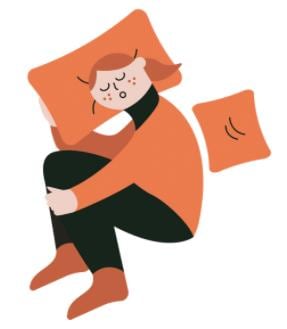Feeling drained, winded, and tired?
Experiencing the loss of motivation?
Decreased satisfaction and sense of accomplishment?
Well, you're burnt out.
Burnout is a state of physical, mental, and emotional exhaustion that occurs due to self-neglect.
In today's fast-paced world, practicing self-care isn't a top priority for many. Only 6.6% of adults (above 25) are engaged in health-related self-care each day.
It’s because most of us are crazy busy with stressful jobs. And, whatever little time we get for ourselves, it is consumed by technology.
As a result, our physical, mental, and emotional health gradually starts deteriorating.
But with everything going on in the world right now – such as pandemics, non-communicable diseases, and environmental degradation, we all need to make sure that we are taking the time to prioritize our self-care.
So, start assessing your self-care routine to ensure you're taking care of yourself, your mind, body, and spirit!
This article talks about why self-care is important and how it impacts your life, along with the best self-care practices for every area of your life.
What is Self Care?

Self-care has been defined as providing adequate attention to one's own physical and psychological wellness ( Beauchamp & Childress, 2001).
The WHO asserts that self-care involves personal factors like self-reliance, self-efficacy, empowerment, autonomy and personal responsibility.
In simple terms, self-care means checking in with yourself on how your body is doing and what it is asking for. Engaging in self-care can improve your mood and help you put your best foot forward.
Self-care is often taken as being selfish, but it is your responsibility to take care of yourself to stay healthy, both physically and mentally. This includes rest, hygiene, nutrition, and medical care when needed.
Types of Self Care Practices
Self-care is different for everyone; for some, it can be running every day, journaling their thoughts, or taking a warm bath.
Self-care can be mental, physical, emotional, or spiritual. Self-care is also connected to the people around you.
Let's take a look at five different types of self-care practices:
Types Of Self Care Practices |
||
| 1 | Physical Self Care | |
| 2 | Mental Self Care | |
| 3 | Emotional Self Care | |
| 4 | Spiritual Self Care | |
| 5 | Social Self Care | |
1) Physical Self Care
Physical self care means taking care of your body. Make sure you are getting enough sleep, staying hydrated, eating healthy, and exercising regularly. It also includes meeting all your physical needs such as hygiene, medication, etc.
When talking about our physical health, we have to talk about the brain because there is a strong body and mind connection (also known as health neuroscience). When you look after your mental health, your physical health will flourish and vice versa.
Here are the top 3 things you must do to ensure healthy physical wellbeing:
1. Movement

No matter what kind of physical exercise, make sure your body is moving. Yoga, pilates, HITT, strength training, muscle training, running, brisk walking; anything works!
So why is movement so important? Looking at the data worldwide, in every country, age group, health status, gender, and socio-economic background studied, physically more active people have better mental and physical health.
Studies show that movement:
-
Manages weight
-
Reduce health risks
-
Strengthen bones and muscles
-
Improves stamina and endurance
-
Improves mood and regulates hormones
-
Increases life expectancy
2. Food and Hydration
How you fuel and hydrate your body also impacts your physical health. Try eating clean, organic, and whole foods such as fresh vegetables, fruits, and whole grains. Avoid processed and junk foods.
According to research, fast eaters are 3 times more likely to be overweight. [Source: Healthline]
Moreover, fast food is the number one cause of obesity, leading to multiple chronic health risks such as type2 diabetes, heart disease, and bone degeneration.
Instead of juices, fizzy drinks, and energy drinks, hydrate your body with water.
3. Sleep

“You will perform better, make better decisions, and have a better body when you get the sleep you require.”
-
Excerpt from Shawn Stevenson, Sleep Smarter
Sleep deprivation can take a significant toll on your focus, energy, mental sharpness and capacity to deal with pressure.
Shawn Stevenson, top nutrition expert and bestselling author of Sleep Smarter, said:
“Sleep quality is more important than diet and exercise combined (for what it does to our health and also physical appearance).”
Getting optimal sleep:
-
Makes you feel well rested
-
Strengthens immunity
-
Regulates Melatonin and other healthy hormones
-
Improves cognitive function
2) Mental Self Care
Since our brain controls the entire body, mental health self care is a very important part of overall health.
Invest in a regimen that promotes high-level cognitive functions, such as memory formation, attention, thought, language and consciousness.
Mental self-care includes eating brain boosting foods and supplements and doing brain stimulating activities that keep the mind.
Brain boosting activities include:
-
Puzzles and games
-
Learning new skills
-
Gaining complex knowledge
A fun way to boost your cognitive performance is by learning new tools. Download Wondershare PDFelement Cloud for easy online document management.
Mental self-care also involves doing things that help you stay mentally healthy such as practicing compassion and gratitude. For this, you can download free journaling templates from PDFelement Pro.
3) Emotional Self Care
Emotional self care plays a huge role in psychological health. And, it is all the more necessary today as depression and mental health problems are at an all time high.
Paula Gill Lopez, PhD and associate professor of psychological consultation says: “We have an epidemic of anxiety and depression… everybody feels it.”
Poor emotional state does not only impact our cognitive performance but has physical altercations as well.
Neuroscientists at the University of Pittsburgh found how stress, depression and other mental states can alter organ function. The research also provides concrete evidence that helps explain why meditation, yoga and pilates can be so helpful in modulating the body's responses to emotional stress. [Source: Science Daily]
Here are some simple things you can do to improve your emotional health:
-
Practice yoga and meditation.
-
If there’s something on your mind, talk to a friend. If it’s something serious, seek a professional’s help.
-
Spot early signs of stress, anxiety and depression and get them treated instead of waiting for it to get better on its own.
-
Journaling is a great way to keep your mindset healthy and keep a mood tracker to stay aware of your mental health.
-
Stay connected to people, but if you don’t have supportive friends or family and feel isolated, join community events of people with common interests.
4) Spiritual Self Care
Spiritual self care has a deep influence on an individual’s mindset. Spirituality comes from within and it has different meanings for different people.

According to research, a lifestyle with religion or spirituality is generally healthier.
However, religion is not the only way to nurture your spirits. It can be anything that develops a deeper sense of meaning and connection with the universe.
Spiritual self care practices include:
-
Meditation
-
Prayer
-
Community service
-
Reading religious or spiritual content
-
Seeking peace and contentment
5) Social Self Care
.

Humans are a social species. We rely on mutual cooperation, bonding and relationships.
But the hustle bustle of everyday life often strips us of healthy social experiences, particularly now, since the outbreak of covid 19. Certain pandemic implemented measures like self isolation and social distancing have caused social uneasiness.
Thus, it has become harder than ever to socialize and meet up with friends and family.
But, we still have to find ways to foster our relationships for the sake of our social health.
Despite all the limitations and time constraints, try to keep up with your social needs through:
-
Regular meetups with friends
-
Family dinners and gatherings
-
And, attend social events
How To Start Your Self Care Journey?
One of the best ways to implement a new regimen or change your lifestyle is journaling.
You can use the template mall of the PDFelement for journaling.
Go to the template mall and find cool templates. For example, the “Fact About Me” template in the picture below.

Wondershare PDFelement Pro DC
Simplify your Workflow with the PDFelement Cloud.

A study shows that writing down your thoughts:
-
Is a therapeutic tool for self-assessment
-
Is a healthy hobby
-
Is an effective way to conduct personal improvement
Moreover, Cheryl Richardson, author of The Art of Extreme Self-Care, says that to begin your self care practice, identify where you feel most deprived in your life.
Richardson suggests asking questions like:
-
Where do I feel deprived?
-
What do I need more of right now?
-
What do I need less of?
-
What do I want right now?
-
What am I yearning for?
-
Who or what is causing me to feel resentful, and why?
-
What am I starving for?
Be specific in your answers, as identifying what lacks will help you determine what you have to do to feel better. For example, if you feel lonely and neglected, you find why. If it is because you have been too busy with work, make up for it by spending more quality time with friends.
Conclusion
“Self-care is anything that you do for yourself that feels nourishing,”
Self care is not heedless splurging or taking a day off after months of exhaustion and stress. Self care is about taking care of your physical, mental, and emotional well-being to improve your health and quality of life.
A self care routine will positively impact your well-being, but only if you are committed to investing in yourself.
So, stop neglecting yourself and make yourself a priority.

